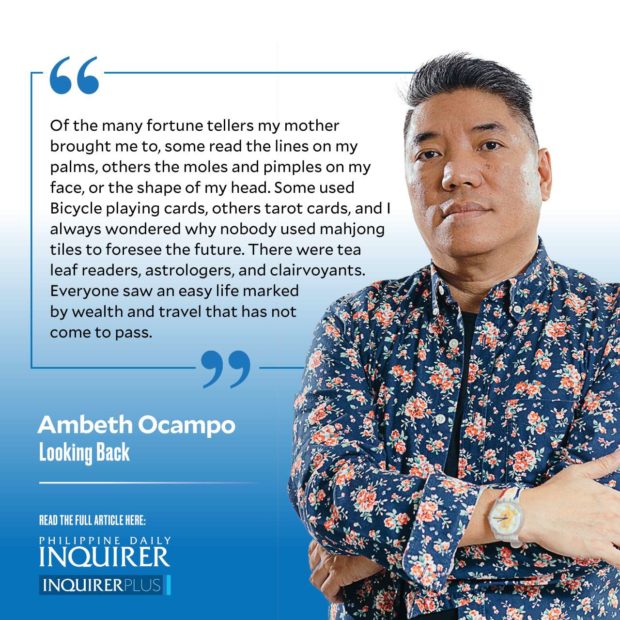Fortune tellers
Shortly before midnight on Dec. 31, 2022, as I reached for a dozen grapes on the dining table to start the countdown to the new year, someone commented “pa-uso ka na naman.” I didn’t comment on the grapes being set in the middle of Mandarin oranges and other round fruits more appropriate for Chinese New Year. I explained that the countdown to the new year in the Puerta del Sol, the navel of Madrid, is marked by the chimes of a clock that strikes 12 times to mark the end of the old year and the beginning of a new one. People gathered in Sol come with 12 grapes in hand to eat, one by one, for each chime of the clock.
In the Philippines, we drive bad fortune away by making noise, through firecrackers whose names I remember from childhood as “watusi,” “laventador,” “triangle,” “whistle bomb,” “five-star,” “bawang,” “sawa,” and “Sinturon ni Hudas.” There are more colorful or suggestive names now like “Lolo,” “Superlolo,” and “Goodbye Bading” that literally give more bang for the buck you pay. I haven’t seen bamboo cannons fueled with hot water and “kalburo” in decades. Those who are scared of fireworks make noise with wooden rattles, drums, and paper horns we know as “torotot” or “pakakak,” which are lewd as they are loud. Children were also told to jump as high as they could at midnight, so they would grow taller.
Article continues after this advertisementAs I reminisced on new years past, I wondered why we celebrate at midnight on Dec. 31 when we should actually be up at dawn to greet the first sunrise of the year. I did just that and took photos of the first daybreak of 2023 from the windows in my study that face east. I remain hopeful that 2023 will be kinder than 2022, but later in the day, I was one of hundreds of airline passengers inconvenienced by the technical glitch in the Ninoy Aquino International Airport. I have since outgrown reading the new year astrological forecast and the visit to fortune tellers to see what a new year has in store for me.
My interest in fortune telling came from my mother who was fond of fortune tellers. She took them seriously, while I accompanied her and listened to my fortune with a grain of salt. Our future does not lie in a deck of tarot cards or fortune cookies—we make our past, present, and future. I think that my mother’s obsession with fortune tellers was rooted in protecting her turf and home. My grandmother (actually my mother’s evil stepmother) planted the seed of suspicion before her marriage, warning her that my father had another family, with children older than us. There was always the fear or suspicion that there was a kept woman somewhere that explained why my father never had bombshell secretaries or associates. Come to think of it, when I was growing up, all the engineers and architects in my father’s orbit were all men. My sister caught a fortune teller/mangkukulam giving my mother instructions on a love potion. She then served this, mixed with my father’s breakfast drink; it consisted of assorted leaves and herbs, as well as pieces of paper with incantations dipped in dad’s orange juice.
Of the many fortune tellers my mother brought me to, some read the lines on my palms, others the moles and pimples on my face, or the shape of my head. Some used Bicycle playing cards, others tarot cards, and I always wondered why nobody used mahjong tiles to foresee the future. There were tea leaf readers, astrologers, and clairvoyants. Everyone saw an easy life marked by wealth and travel that has not come to pass. I was supposed to live to 35, the same age when Rizal was shot—that has not come to pass either. Two stand out, first was a Thai lady who entered the Bangkok restaurant where we were feasting on phad thai and predicted “you will make a living with your mouth.” In retrospect, I did make a career by teaching and lecturing. The second was the only one who predicted bad news. This one said that I would die or be killed in a red car. That’s why we never had red cars. While the fortune teller declared that the future can be altered if I consciously avoid red cars for the rest of my life, she added sadly, “On that day, you will forget.”
Article continues after this advertisementEmilio Aguinaldo’s mother had a difficult childbirth. Firecrackers were exploded under Trinidad Famy’s bed to force the baby from the womb. Emilio’s first breath was gunpowder, a foreshadowing of his military career. Historians ignore such stories that try to explain why heroes and villains made the nation turn out the way it did.
Comments are welcome at aocampo@ateneo.edu

















